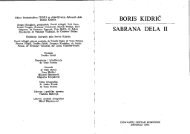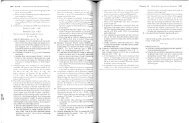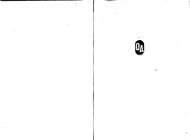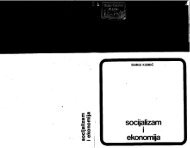Daniel l. Rubinfeld
Daniel l. Rubinfeld
Daniel l. Rubinfeld
You also want an ePaper? Increase the reach of your titles
YUMPU automatically turns print PDFs into web optimized ePapers that Google loves.
360 Part:3 Market Structure and Competitive Strategy<br />
o Market Power: Monopoly and Monopsony 361<br />
antitrust laws Rules and<br />
regulations prohibiting actions<br />
that restrain, or are likely to<br />
restrain, competition<br />
parallel conduct Form of<br />
implicit collusion in which<br />
one firm consistently follows<br />
actions of another,<br />
firms from acquiring excessiv'e market power in the first place, and to limit<br />
use of that power if it is acquired. In the United States, this is done via<br />
antitrust laws: a set of rules and regulations designed to promote a competiti\7<br />
economy by prohibiting actions that restrain, or are likely to restrain, compeli~<br />
tion, and by restricting the forms of market structure that are allowable,<br />
Monopoly power can arise in a number of ways, each of which is covered<br />
the antitrust la\vs. Section 1 of the Sherman Act (vvhich was passed in 1890) prohibits<br />
contracts, combinations, or conspiracies in restraint ot trade. One obvious<br />
example of an illegal combination is an explicit agreement among producers to<br />
restrict their outputs and/ or "fix" price above the competiti\'e le\'eL There have<br />
been numerous instances of such illegal combinations. For example:<br />
II In 1983, six companies and six executiyes were indicted for conspiring to fix<br />
the price of copper tubing over a six-year period.<br />
II In 1996, Archer <strong>Daniel</strong>s Midland Company (ADM) and two other major producers<br />
of lysine (an animal feed additive) pleaded guilty to criminal charges<br />
of price fixing, In 1999, three ADM executi\'es were sentenced to prison terms<br />
ranging from two to three years for their roles in the price-fixing scheme. IS<br />
II In 1999, four of the world's largest drug and chemical companies-Roche<br />
AG. of Switzerland, BASF AG, of Germany, Rhone-Poulenc of France, and<br />
Takeda Chemical Industries of Japan-were charged by the US. Department<br />
of Justice 'with taking part in a global conspiracy to fix the prices of vitamins<br />
sold in the United States. The companies pleaded guilty to price fixing and<br />
agreed to pay fines totaling more than $1 billion,19<br />
Firm A and Firm B need not meet or talk on the telephone to violate Section 1<br />
of the Sherman Act; illlplicit collusion in the form of parallel conduct can also be<br />
construed as violating the law. For example, if Firm B consistently follows FimJ<br />
A's pricing (parallel pricing), and if the firm's conduct is contrary to what one<br />
would expect companies to do in the absence of collusion (such as raising prices<br />
in the face of decreased demand and o\'er-supply), an implicit understanding<br />
mav be inferred .. 20<br />
Section 2 of the Sherman Act makes it illegal to monopolize or to attempt to<br />
monopolize a market and prohibits conspiracies that result in monopolization.<br />
The Clayton Act (191-±) did much to pinpoint the kinds of practices that are<br />
likely to be anticompetitive. For example, the Clayton Act makes it unlawful for<br />
a firm with a large market share to require the buyer or lessor of a good not to<br />
1S In 1993, AD0.! and three other firms were charged I\'ith fixing carbon dioxide prices In the lysine<br />
case, proof of the conspirac}' came in part from tapes of meetings at which prices I\'ere set and market<br />
shares divided up At one meeting with executh'es from Ajinimoto Company of Japan, another<br />
lysine producer, James Randall, then the president of ADM, said, "We ha\'e a saying at this company,<br />
Our competitors are our friends and our customers are our enemies." See "Video Tapes Take Star<br />
Role at Archer <strong>Daniel</strong>s Tria!," NelL' York TiJiles, August -±, 1998; "Three Sentenced in ,-\rcher <strong>Daniel</strong>s<br />
Midland Case," Neil' )'ork Tillle5, July 10, 1999<br />
1" "Tearing Do\\'n The Facades of 'Vitamins Inc. '," New Y('rk Tillie:;, October 10, 1999<br />
211The Sherman Act applies to all firms that do business in the United States (to the e"tent that a con'<br />
spiracy to restrain trade could affect U S. markets) Ho\\'e\'er, foreign go\'ernments (or firms operating<br />
under their go\,ernment's control) are not subject to the act, so OPEC need not fear the wrath ,<br />
the Justice Department. Also, firms call collude \\'ith respect to exports. The vVebb-Pomerene ACl<br />
(1918) allm\'s price fixing and related collusion with respect to export markets, II:; It,;);;: as<br />
lIIarkets are IIIltltjL'cled b(1 sllcil COllU5ioll. Firms operating in this manner must form a "Webb-Pomerene<br />
Association" and register it with the gm'enunent<br />
buY from a competitor. It also makes it illegal to engage in predatory pricingrlcing<br />
designed to drive current competitors out of business and to discourage<br />
~ew entrants (so that the predatory firm can enjoy higher prices in the future).<br />
Monopoly power can also be achieved by a merger of firms into a larger and<br />
jllore dominant, firm, or by one firm acquiring or taking control of another firm<br />
bv purchasing ItS stock The Clayton Act prohibits mergers and acquisitions if<br />
they "substantially lessen competition" or "tend to create a monopoly"<br />
The antitrust laws also limit possible anticompetitive conduct by finns in<br />
other ways. For example, the Clayton Act, as amended by the Robinson-Patman<br />
Act (1936), makes it illegal to discriminate by charging buyers of essentially the<br />
same product different prices if those price differences are likely to injure competition.<br />
Even then, firms are not lia~l: if they can s~ow tl:at the price differences<br />
were necessary to meet competitIOn. (As we WIll see m the next chapter~<br />
price discrimination is a common practice. It becomes the target of antitrust<br />
action when buyers suffer economic damages and competition is reduced.)<br />
Another important component of the antitrust lavvs is the Federal Trade<br />
Commission Act (1914, amended in 1938, 1973, 1975), which created the Federal<br />
Trade Commission (FTC). This act supplements the Sherman and Clayton acts<br />
by fostering competition through a whole set of prohibitions against unfair and<br />
a~ticompetitive practices, such as deceptive advertising and labeling, agreements<br />
with retailers to exclude competing brands, and so on. Because these prohlbitions<br />
are interpreted and enforced in administrative proceedings before the<br />
FTC, the act provides broad powers that reach further than other antitrust laws.<br />
The antitrust laws are actually pluased vaguely in terms of what is and what<br />
is not allowed. They are intended to provide a general statutory framework to<br />
give the Justice Department, the FTC, and the courts wide discretion in interpreting<br />
and applying them. This is important because it is difficult to know in<br />
advance what might be an impediment to competition, Such ambiguity creates<br />
a need for common la\'\' (Le" the practice whereby courts interpret statutes)<br />
and supplemental provisions and rulings (e.g., by the FTC or the Justice<br />
DepartInent).<br />
Enforcement of the Antitrust laws<br />
The antitrust laws are enforced in three ways.<br />
1. Through the Alltitrust Division of the Departlllellt Lf fustice. As an ann of the executive<br />
branch, its enforcement policies closely reflect the view of the administI'ation<br />
in power. As the result of an external complaint or an internal study, the<br />
deparhnent can institute a criminal proceeding, bring a civil suit, or both. The<br />
result of a criminal action can be fines for the corporation and fines or jail sentences<br />
for individuals, For example, individuals who conspire to fix prices or<br />
rig bids can be charged with a felollY and, if found guilty, may be sentenced to<br />
jail-something to remember if you are planning to parlay your knowledge of<br />
microeconomics into a successful business career! Losing a civil action forces a<br />
corporation to cease its anticompetitive practices and often to pay damages.<br />
2. Through the adlllillistrative procedures of the Fedew/ Twde COIl1/1lission. Again,<br />
action can result from an external complaint or from the FTC's own initiative.<br />
Should the FTC decide that action is required, it can either request a<br />
voluntary lmderstanding to comply with the law or seek a formal commission<br />
order requiring compliance.<br />
predatory pricing Practice of<br />
pricing to drive current competitors<br />
out of business and to<br />
discourage new entrants in a<br />
market so that a firm can<br />
enjoy higher future profits.

















